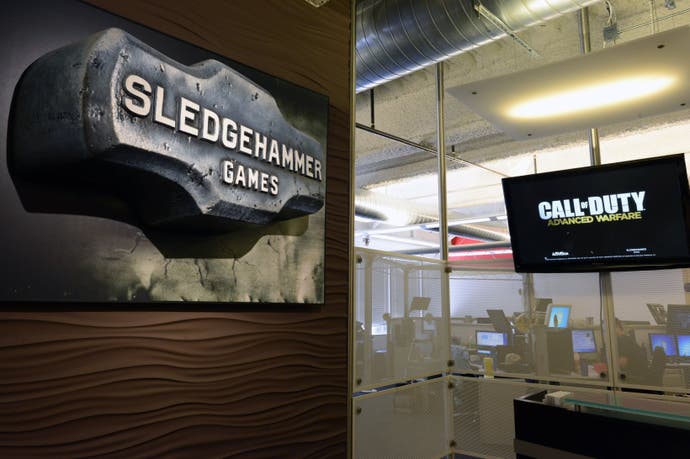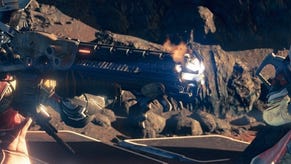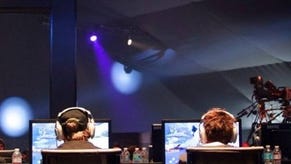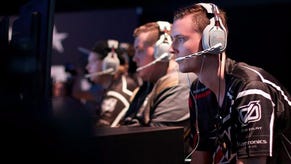The Sledgehammer effect: "We want to change Call of Duty"
How the Dead Space approach is having an impact on the shooter series.
Glen Schofield is a tank of a man. The kind you'd expect to make floorboards quake, the type of person you'd conjure up in your mind if you were ever asked to picture the talent behind Call of Duty; strong, direct, American. And he makes his entrance into Sledgehammer Games' presentation theatre on an oversized scooter, playfully crashing into colleague and studio co-founder Michael Condrey, waving to the room with the sunbeam smile of a children's entertainer. Maybe he's not quite what you'd imagine of a Call of Duty developer after all.
Sledgehammer Games likes to make a habit of subverting expectations, you suspect. It's the studio set up to explore new directions for the Call of Duty series, at first building a third-person, horror-tinged take on the Vietnam war that leant heavily on its prior work on Dead Space. Then it was the studio that came to the aid of Infinity Ward during the messy departure of its founders, delivering Modern Warfare 3 - and what was, soon after its release, the greatest-selling entertainment product of all time - in little over 18 months. Now it's the studio that's about to pull Call of Duty out of its groove - or, to put it a little less politely, its rut - and inject new life into what's recently felt like something of a tired franchise.
At the heart of Sledgehammer are Schofield and Condrey, a pair who first met at EA's Redwood Shores' studio when they were working on the Bond franchise, producing games such as Agent Under Fire, Everything or Nothing and From Russia With Love. There's a spark between them that comes from having worked so closely together for well over a decade, the crackle of putdowns and quick quips that makes an audience with them feel like you're with games development's very own odd couple.
"We've been called that before," says Condrey. "Oscar and Felix."
"I'm like a neater version of Oscar," says Schofield proudly, before Condrey snaps back in. "Have you seen your office? You need a hazmat suit just to get in there."
It's not quite Eric and Ernie, but Condrey and Schofield have a tight bond, as does much of Sledgehammer Games. A core group within the studio has stuck together from Crystal Dynamics through to Redwood Shores and then Visceral before arriving here at Foster City, at an office that overlooks Silicon Valley. Through their shared experiences they've come to understand what makes a blockbuster tick, and what it takes to make a series that's critically loved. It's something they learnt after making a game that wasn't as well loved as they'd have liked.
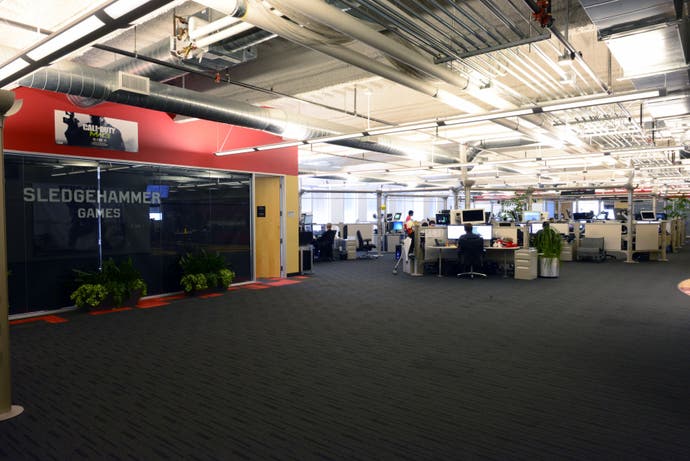
"After we finished From Russia With Love, we thought we had a good game," Schofield says of the 2005 PS2, Xbox and GameCube title that went back to Connery-era Bond. "It wasn't as highly rated as we'd have wanted. In fact, it was pretty devastating. I can't believe we worked that hard, and it wasn't that it was a bad game - it just wasn't the game we wanted."
So Schofield, Condrey and the team at Redwood Shores set about making the game they wanted to make. "At that time EA wasn't embracing new IP in the way they are today," says Condrey. "There was that moment where - and I give credit to Glenn, because he was the catalyst for that - he said we're not doing that again. We're not being pushed to make a game where we're under-resourced and that we're not proud of. So we want to handpick a small team, and show them that new IPs can be successful. We built a small team with that agreement in place, but it was scrappy to keep that team alive."
It took some 18 months for EA to green light the original, during which time the team built a prototype, a vertical slice that featured everything that would go on to distinguish Dead Space, and would find itself into the game's third chapter, Course Correction. It introduced the dry horror the Ishimura, the grotesque Necromorphs that stalked inky black shadows and the serene, surreal moments executed in zero gravity. When the finished game finally released towards the end of 2008, it was held up in many quarters as a contemporary classic, a continuation of the action horror of Resident Evil matched with exquisite production values.
"On Dead Space, we got a chance," says Schofield. "It was so single-minded, the focus on quality and nothing else. At the end of the game we just focussed on quality. I remember being on a PR tour the day it came out, and looking at the scores. I was like, holy shit. I'd never even thought about it. The team, they were eight hours ahead - but we hadn't talked about it. We just talked about making a quality game. Then we started getting award nominations, which we hadn't even thought of. We started winning awards, and we were like - see. You focus on quality, that's what you get."
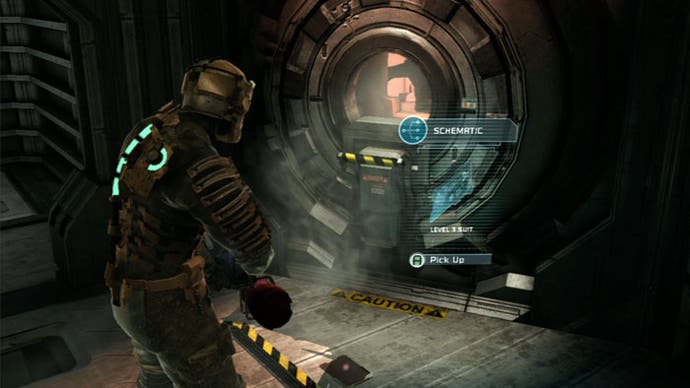
So why, after the critical success of Dead Space, did the core team - by then rebranded as Visceral Games - decide to move on? "At that point, I remember thinking when I took over the studio that we knew what we wanted," says Schofield. "But we had inherited a big studio. Over the course of a few months had to let go of the senior management team. That was just painful. I had run Crystal for a while, we run big teams and running the studio there... I was like, we should build our own. We had a very senior team. People had families and commitments and things like that, and we thought security was the most important thing. Instead of going for funding, which we had been offered, our five year plan was we wanted to work for one of the biggest publishers in the world, on one of the biggest titles in the world and put our business practices together on that."
"A lot of big publishers wanted us to do what we'd done for Dead Space for them"
Michael Condrey
Before it found the publisher it wanted to work with, Schofield and Condrey batted away some tantalising offers. "We can't get into specifics," says Condrey. "The bottom line, Dead Space was the action game of the year, in a space where a lot of big companies didn't have survival horror games. It meant that a lot of big publishers wanted us to do what we'd done on for Dead Space for them.
"Even a big publisher that did," teases Schofield. Could that have been Capcom with its own Resident Evil? "Could have been," he replies coyly. "We never got in that great a detail. Activision was really interested. They asked if we'd like James Bond, we said no, would you like this, we're like no. How about Call of Duty? We were like, now you're talking. The biggest publisher, biggest game and we're entertainers. That's what we do. What a challenge."
"And what an opportunity," says Condrey. "At that time, it was clear that Activision was giving teams the resources that they need. I remember Dave Stahl, who was our first boss, said you're here to make a great game. Don't come to me about how you're going to save money, how you're going to outsource. We're going to give you everything you need to go out and make a great piece of software. They let us build this studio, they let us hire the developers we wanted. Whatever happens, it's all on us. Activision's done everything they could to put us in a position to win."
Given Activision's so often perceived as a pantomime villain it's a sentiment that may be hard to swallow. But Sledgehammer's first pass at Call of Duty, a third-person adventure more in keeping with the team's work on Dead Space that took place in a horror-tinged Vietnam suggests Activision was happy to see Sledgehammer Games run with its own ideas. "At that time it was taking Dead Space's learnings and applying it to the Call of Duty fiction," says Condrey. "In your head you instantly can imagine an Uncharted-style of game, but done in the lore of Call of Duty. You can see that. We built a prototype and it was cool. It was a true gritty Apocalypse Now take on Vietnam in an interactive way. We had a 15-minute demo, and there were some great moments."

"We did Vietnam because it was scary, it was gritty," says Schofield. "The tunnels of Cambodia, it was all very interesting. But it was a different game. It wasn't twitch. Was it Call of Duty? Well, it said Call of Duty."
The fallout at Infinity Ward meant that Sledgehammer Games was soon working on something undeniably Call of Duty, as it stepped in to help on development of Modern Warfare 3. It was a baptism of fire, the team delivering the single-player campaign in around 18 months while Infinity Ward worked on the multiplayer. The reception was positive, the sales more so, earning Sledgehammer Games a chance to work again on its own entry in the series.
"That was another moment where we were really proud of the software," Condrey says of shipping the game. "But still, there was some feedback that it wasn't ambitious enough, that it relied too much on the Call of Duty recipe."
"I never want to hear that again," says Schofield. "For us, we were dead set on innovation," says Condrey of Sledgehammer's approach as it went into its new project. "We want to change this thing."
Which brings us to Advanced Warfare, Sledgehammer Games' second Call of Duty but the first it can wholly call its own, and the first to benefit from the new three year development cycle the series has taken up. It's a game wholly made by Sledgehammer Games too, a step away from the tangle of studios that helped build last year's Call of Duty: Ghosts.
Is Advanced Warfare truly innovative? It's a term perhaps worn thin after its misuse with the marketing of Ghosts last year, a game that fell back on a canine companion and rusted reticules for its additions to the formula, but Sledgehammer Games' own Call of Duty genuinely looks like the biggest step forward for the series since 2008's Modern Warfare.
It's helped along by Sledgehammer Games' own environment, an open, bright space in Foster City that is the epitome of the Silicon Valley it looks out across. Different teams are interspersed, allowing for cross-discipline communication, and it's not just Schofield who has a scooter - even if his is remarkably more pimped out than the others. Workers scoot between desks, sharing thoughts and ideas, and there's a busy hum as the team works towards submission. It's all so much more colourful than you'd imagine a Call of Duty developer to be.
Even the process can seem a little left of centre. Late last year, during the height of production, the team broke up to take part in a company wide game jam. "It was driven by two thoughts," says Condrey. "Everyone's a gamer, and everybody's voice needs to be heard - whether they're in QA, operations or actually a game designer. We're always looking for ideas to spring up organically. But there was a point last Christmas, the team was tired. So we gave them two weeks to free themselves from the schedule, to pitch new ideas and to let them charge their batteries a little, creatively. We'd been on the sprint for a while. It was all organic - we didn't even tell anyone they had to to it. It was a two week period before Christmas were you could self-assemble a team."
Around 100 submissions were made by the team as a result of the jam, the winning idea - the ability to tear car doors off and use them as a shield, thanks to the strength lent you by your Exosuit - making its way into Advanced Warfare. It's a part of the future tech tapestry that works to distinguish Advanced Warfare from other Call of Duty games, its extended vocabulary of movement making for an experience that feels familiar with the right amount of fresh elements thrown in.
"The Exo was kind of the anchor to a lot of discussions and ideas that were happening, post-Modern Warfare 3 when we were talking about what's the right fiction, what's the right time-frame," says Condrey. "At the same time, the prototype team were making boost boots - it was pretty sci-fi. We knew it was amazing, and it transformed how you play. So these ideas gravitated together. It kind of all gelled.
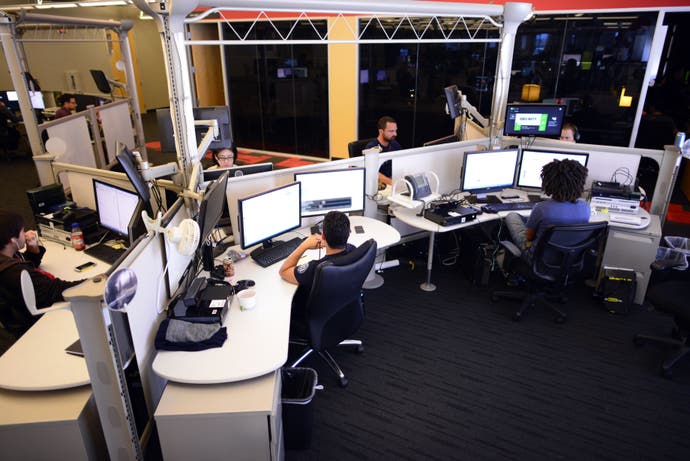
"With the Exo, we knew we had strength, we had stamina," says Schofield. "We could put systems around it. I'd say the harder part - obviously there are a lot of hard parts. The hard part was what the world looks like in 50 years. That was one where we'd sit down and say, I'm a science fiction fan, that should be easy for us. You find out that everyone's vision of 50 years ahead is so different. With Dead Space, it was like 500 years in the future, here's my thoughts. People don't even think about it. But 50 years? Everyone has an opinion."
It seems there was some convergence of opinion, and not just within Sledgehammer Games. Months before Advanced Warfare's reveal, Respawn - the studio formed by Infinity Ward founders Jason West and Vince Zampella - released Titanfall, a shooter with an emphasis on quick movement, and with future tech playing a part in the form of hulking mechs and boost boots. Advanced Warfare was already well into development by the time Titanfall had been announced - but surely its reveal must have impacted Sledgehammer in some way.
"This is different. It's our world. We never backed off, we never changed"
Glen Schofield
"There was definitely an 'ugh, I hope people don't think we've ripped them off' moment," says Schofield. "But it was our own. We thought are we going to keep it, but yeah - this is different. It's our world. We never backed off, we never changed.
"I'd agree," says Condrey. "It came down to, as gamers, this could be fun. For us we knew we were delivering on this really amazing campaign, which they didn't have, our take on multiplayer will be different, we had co-op which they didn't have. We had Call of Duty, and we know what we're doing. We wanted to go back to the very first green light we had with Activision - at that time, our ideas were really pretty progressive. Now you look at it, post other games that have exos, post Oblivion, everyone's like, Exos, that makes sense. Three years ago, it was hard to sell that idea to people. All this stuff that we're doing that today, pop culture and news stories have picked up."
Advanced Warfare feels very different to Titanfall, just as it feels different to other Call of Duty games. The expanded movement, with boosters allowing you to hover or sidestep in the air, adds a zippy layer to the already fast-moving Call of Duty formula. Multiplayer matches are frenetic, acrobatic affairs, with a pace that sometimes feels in keeping to more classic 90s PC fare.
How exactly that transfers to the single-player remains to be seen, but given Sledgehammer's expertise the campaign could well prove Advanced Warfare's strongest suit - something that hasn't been able to be said about Call of Duty for years. There are some subtle shifts that bode well - no longer are missions separated by abstract graphics, but are rather now introduced by cutscenes that do a better job of establishing the narrative. Story is important to Sledgehammer Games, to the point where, for the first time in years, it was written internally rather than farmed out to a big name Hollywood scribe.
"That was conscious on our part," says creative director Brett Robins. "We felt like we had a great story. We worked on it a long time, we liked where it was going, we were happy with it. We brought in consultants who validated it. It does help internally, having that crossover between gameplay and story, because you understand what needs to be told in the course of a level. I think it makes for a stronger campaign, definitely."
Much of what made Dead Space a success has also factored in to Advanced Warfare's storytelling. "The biggest thing, having worked on Dead Space, was the focus on narrative, in terms of mood and atmosphere," says Robins. "One of our goals when we worked on Dead Space was constant immersion - don't ever have them snapped out of the world in any way. We have that in Advanced Warfare, where you're getting rid of elements that are distracting, as much as possible. Some of our levels are longer than you might expect in a normal Call of Duty level, and we want to keep you in a certain emotional space for a long time. If an emotional event happens, we try to really play it out, and not jump to another emotional space."
The emotional arc in a Call of Duty game typically seems to be a steep one punctuated by ever louder explosions, mimicking the cinema of Michael Bay, though Advanced Warfare is trying for something else.
"Well, I prefer James Cameron over Michael Bay myself," says Robins. "I think we made a couple of decisions that help - and I agree, it's a high adrenaline, high action experience, and when you're in that frame of mind it's easy to lose the story. The story follows a single character throughout every level. That offered us a certain amount of clarity in the narrative. You're not having to constantly remind yourself or ask yourself who am I, and why am I here? In any given level, if the player paused the game and just stopped, they could answer the question why am I here? And why do I care? As long as they've always got that in my mind. It's something I'd always remind myself of when developing the story, and developing the levels."
It's a simple solution for a series that's got lost in its own noise all too often in recent years, and it's that simplicity that drives much of Sledgehammer Games' work on Advanced Warfare - it's the kind of clean, unmuddled ambition Call of Duty very much needs as it strives to be as relevant now as it was during the heyday of the last generation. "There's no other field, for me, where the fans push you for ambition," says Schofield as he outlines a lengthy future for the series. "I don't think they write to writers and say hey, your next book better be innovative. Your next movie, Spielberg, it better be innovative. This industry, they're vocal. And they push, push, push."
Later, after the interview and away from his scooter, Glen Schofield walks around with the aid of a Sledgehammer Games-branded walking stick which he wields like Mjölnir itself. I ask where exactly the name Sledgehammer came from. "Well, we want to make an impact," he explains in his slightly gruff voice. "And, well... There's nothing particularly subtle about us either."
This preview is based on a trip to a press event in San Francisco. Activision paid for travel and accommodation.
